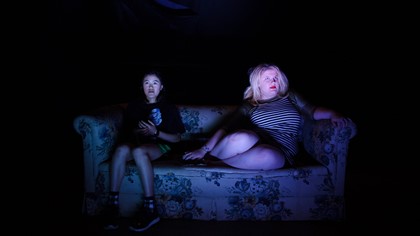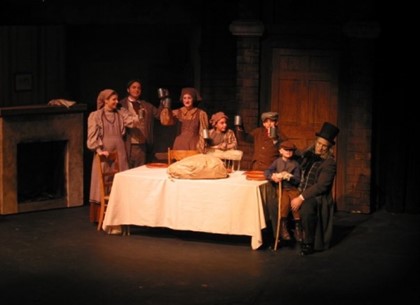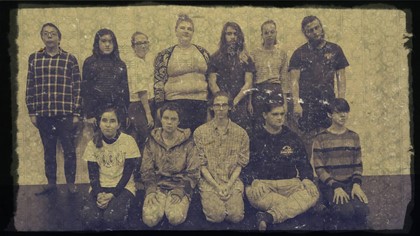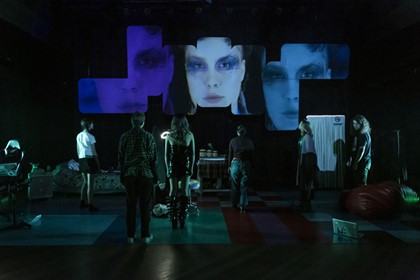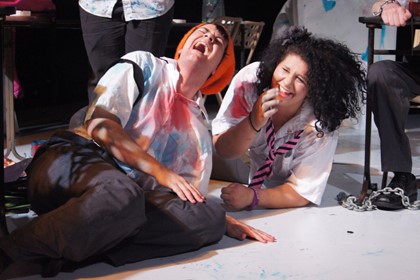Provocation: Teen Angst in Utopia
'It’s human habit to cling to our history, to hold tight to the old ways. But there’s nothing quite like the disinterested stare of a 15-year-old to let you know that your traditions are no longer relevant.'
Posted Jun 09, 2021
Riot Stage writer Morgan Rose shares five principles they’ve discovered making work with young people.
In my early twenties, grappling with my unemployability, clutching my BA in Theatre Arts to my chest, I decided theatre was a self-centred undertaking. I had just moved to Seattle from New Orleans, post-Hurricane Katrina. ‘They don’t need artists, they need carpenters’, I told people when they asked why I left.
I felt guilty for my selfish love of this ridiculous artform, I felt guilty for my lack of tangible skills. I felt helpless—that is to say, without the ability to help. I could have been an electrician or a doctor or a cook. But I made theatre. Shit.
I loved it. I unreasonably loved it. It’s hard to truly articulate why, in the same way, it’s hard to articulate why you love your partner. No sentence can sum it up really. And so I did the selfish unreasonable thing and didn’t give up.
I started searching for theatre that mattered. I had been formally educated on Shakespeare, Tennessee Williams, and Arthur Miller—[white male] poets, all of them. But I found no personal meaning in their work, only a sort of awe at their prowess. Desperate to change the world (like most 20-year-olds), I researched [men] Boal, Grotowski, and Suzuki. They did not provide an antidote to my ennui.
I started working with kids. What nobler profession is there than teacher? The youth could lend me purpose! My ‘useless degree’ didn’t give me the ability to teach anything but theatre, so I rounded up a group of teenagers and we made a show.
And look…
It was life-changing.
Maybe (hopefully) for some of the kids as well, but mostly for me. It’s where I learned everything I now know about theatre. It’s where I learned much of what I know about the world.
It’s where I saw young people be vulnerable, and connect, and be human with each other. It’s where I saw them grow bold and have weird ideas and try them out and fail and sometimes succeed and care about the world around them and work really hard as a group to make something impossible.
My little search for meaning led me to become one half of the youth company Riot Stage (the other half is Director Kat Cornwell). As Riot Stage, Kat and I have collaborated with teenagers to create new work for adult audiences for over a decade. It’s great, difficult, joyful work.
Now, to be completely honest, theatre with young performers is not something audiences are hankering to see. I get it. I make this kind of theatre and often don’t feel inclined to buy tickets to other youth shows. There’s a good chance it will be melodramatic, badly performed, sap (though it must be noted this is not a risk adult shows are immune to). Most youth theatre involves scripts that aren’t written with young people in mind. Indeed, the young are often asked to play characters twice their age.
When working with young actors, we adults love giving them classics. We put wigs on them and have them play kings and queens. We give them the big plays, with the big emotions: murder, incest, rape. Even when they represent age-appropriate characters, those characters are often an adult’s strange idea of what a child is, based on their aging experience of what a child was. But the world is changing, children are changing, and so our stories about children must change as well.
Storytelling is different than it used to be. I still don’t find much I can relate to in Shakespeare or Miller. You know what’s more relevant to my life than Macbeth? A TikTok dance. An Ijeoma Oluo rant. A Kardashian episode/advertisement—relevant maybe only in the impossible chasm between my life and theirs, despite the fact that we inhabit the same world, but relevant nonetheless.
The stories we tell are changing and how we tell them is changing as well.
We consume them in new ways: in 30 second bites, in 15 one-hour blocks consumed in one sitting, or through interactive games played with people on the other side of the world we have never met. We consume far more story than any generation before us. We consume it in bed, while making dinner, on the train on the way to work. We are story monsters, we gobble it up.
How we reckon with this in the theatre is still in flux, especially post-2020. How we make theatre, who makes it, and which bodies stand in front of an audience are necessarily in flux with the rest of it. It’s human habit to cling to our history, to hold tight to the old ways. But there’s nothing quite like the disinterested stare of a 15-year-old to let you know that your traditions are no longer relevant.
Together, Kat and I became painfully aware that working with young people demanded a paradigm shift. The things we had been taught at drama school would not work here. The slow-paced breathing exercises, that horrible drama game Sound Ball, the ‘leave your problems at the door’ mentality—the young were having none of it. They were bored, they were embarrassed, they didn’t see how any of it mattered. Kat and I conceded to the wisdom of the room.
Over the years we developed a methodology that we at first thought was specific to working with teenagers, but turns out is applicable pretty much anywhere. There is lots to say about what the kids taught us, but for brevity’s sake I’ll start with a few overarching principles to how we create that I will attempt to articulate for the first time here:
- If you are leading, your primary job is to listen
- No one has to do anything they don’t want to
- Any person that wants to be can be a performer
- The work is born from the performers
- It should be joyful
If you are leading, your primary job is to listen.
The world would have us believe that leaders are meant to speak up. How can they guide us if they aren’t giving lengthy speeches and telling us what to do? When put in charge of a process for the first time, I felt the pressure to have OPINIONS and speak of them often and with great certainty. The truth is, long speeches and rigid ideologies do not equate with progress.
Speeches don’t work on teenagers. Kids spend the first decade of their lives having the entire world explained to them. They listen because they have to. Then, finally, they reach breaking point. They have had their fill of listening, and they stop.
It is at this point that as adults we begin to feel betrayed by them. We don’t understand them, they irritate us. I know this because I have recently become middle-aged and started thinking ‘I don’t understand these kids’.
Listening, we have found, is the best way to get to the other side of irritation with another human being. The young have experiences that the old can’t fathom. And vice versa.
The value of a leader with genuine interest in what another person has to say cannot be underestimated. It leads to a deeper understanding of a situation, a connection with another human being, and perhaps, closer proximity to whatever you are striving towards.
Uncertainty is a valuable tool. Uncertainty paired with curiosity can be revolutionary. If you are leading, it is your job to ask, in as many different ways as you can fathom, ‘Tell me who you are and what you think’.
No one has to do anything they don’t want to.
This is to say: anyone can opt out of any activity at any time with absolutely no consequences. The fact that this concept felt revolutionary to me when we first officially introduced it to our rehearsal room is baffling.
Forced participation is a hangover of the school system which drains all choice from us. We have to go to class. We have to do the assignment. Fears of public speaking do not preclude you from your oral presentation. You are at the mercy of the adults around you. It’s brutal.
School primarily teaches us to obey, to be the thing the person in charge wants us to be. It rarely teaches us to think for ourselves. It rarely teaches creativity or individuality. (Important side note: this is despite the valiant efforts of an army of brilliant teachers—my parents included—attempting to work within a restrictive system).
In a rehearsal room, we have to first unlearn getting things right. We have to unlearn the thought that there is a correct answer. We have to learn how to find and choose what we like.
When most young people come into our rehearsal room, they get up and trudge through every exercise despite their discomfort, attempting to replicate what they think we are looking for.
Discomfort on stage is impossible to hide. An uncomfortable performer can make an entire audience uncomfortable. So in our rehearsal room, you only do an exercise if you want to do it. If you are scared of it, you are supported to work through that fear, but it has to be something you want to work through.
This complete autonomy extends through to performance. A standing rule is that you can always change your mind. If you decide five minutes before the performance that you no longer want to perform, that’s okay, you don’t have to perform. We can solve that problem, it’s a small one in the grand scheme of things. No performance is worth regret.
Imagine if this concept was used in professional, adult settings…
Any person that wants to be can a performer.
Acting schools can be a weird nest of old traditions: Breaking young actors down to build them back up, stripping them of their unique personalities with the justification that once that’s happened the young performer can then layer character over the top of a ‘neutral’ human body, whatever that is (we all know what they mean by that though, don’t we?).
Perhaps this is because historically the banal minutiae of being a person was not necessary to theatre-making. Small, real moments were not something we recreated on stage. Theatre existed for a very long time with stereotype in place of character. Before the invention of methods of mass-producing story, humans, wherever they existed on the planet, had only a few stories meant to represent the entirety of the world, its history, and its people. So we necessarily let broad concepts sit in place of real characters: the queen, the villain, the child, the doctor.
But contemporary storytelling has moved past this. The idea that the actor must provide a ‘neutral’ canvas over which to lay these stereotypes is simply untrue. Each human being, in all their strange complexity and uniqueness, is worthy of an audience. After all, ‘good character’ is just code for ‘real person’. Now we have brilliant performers like Michaela Coel and Frances McDormand who bring, not a neutral canvas, but their own humanness to each role. They are experienced performers, surely capable of stripping away their quirks, but why do that?
Audiences revel in the quirks and vulnerability of a performer. So rather than stripping away the humanity of students, why not cultivate it? Celebrate a lisp (how beautiful is a lisp?) or tattooed arms. Why can’t Hamlet have a lisp? Why can’t Ophelia have tattoos? This obviously goes hand in hand with cultural diversity, diversity in ability, body type, age etc. Each of these could be an essay in itself.
Every person who is interested in being on stage can be interesting on stage. Every person is fascinating. To be a performer, the only requirement is a willingness to be vulnerable in front of strangers. This ethos works with any group of people: trained actors, non-performers, and indeed teenagers.
This isn’t to neglect the real skill of professional performers. It’s just to say that just as you can train to be a doctor if you want to, you can also train to be a performer. It’s not a mystical profession. Talent, while it exists, is overrated. The necessity of a particular ‘look’ has been officially debunked. All it takes is the desire. The rest can be learned with practice, and what can’t be learned is bullshit.
The work is born from the performers.
Kat and I make devised work, work that is by and, in many ways, about the people performing it. As leaders, we bring a provocation to the table and then we let the room respond. We create improvisation structures that people can exist within that are both very specific and very flexible (‘have a conversation about pain’ or ‘choose an environment and move through it in slow motion’). Within these structures, each person has the power to create, and outside of these structures, through debrief, each person has the power to veto. Performance is created through a long term act of consensus.
I am in awe of the actor. It’s scary work. The primary skills we cultivate in our rehearsal room are trust and vulnerability. A great performer is one who is able to trust the audience with their ego, one who shows us beneath the facade of organised prettiness, one who mirrors to us our own ridiculousness. We love them for this. They make us want to protect them.
And so, at Riot Stage every performance is created with this as the starting point. ‘What do you want to tell us? What piece of yourself do you trust the audience with?’ The show grows from these seeds.
It should be joyful.
Theatre was life-defining in my adolescence. It was how I learned to be around people, how I learned to collaborate and be kind and speak my mind. I see this happen time and time again with the teens I work with. They come in shy and uncertain and leave boisterous and grounded.
It’s a thing. Ask anyone who leads teens through drama. I’m sure the same thing happens at soccer practice, although I wouldn’t know, I’m terrible at all sports and found them only to be humiliating. So I don’t argue for the arts above all else. I argue for them alongside all else. Some will find themselves in the theatre, some on the football field.
They offer similar experiences: community, group effort, a difficult to achieve a common goal, both can be damaging if mishandled, both can be formative when led with kindness and rigour, both are incubators of great joy.
I advocate for joy in whatever form it takes. If theatre or sport ceases to be fun for you, I advocate for you to stop, we will be okay without you. Suffering for art is a fallacy. There is no point. Participate because you love it. It’s likely not going to pay your bills, so really joy is the only reason.
‘Adults, as commonly understood, simply do not exist. We are all children, we are all vulnerable, and we are all always figuring out how to cope with complex situations in ways that will be, in all likelihood, less than perfect’
— Darren O’Donnell (Mammalian Diving Reflex)
Creating theatre with a room full of 16-year-olds ain’t the easiest way to make a show. The chances of failure are high, the air is fragile, audiences likely will be small, and finding a true expression that reflects both my middle-aged being and the teen performers is an almost impossible thing to locate inside ourselves. But then again, all these things could be said about any rehearsal room. What air isn’t fragile? What joint self-expression isn’t almost impossible?
Lately, I’ve found myself more and more frequently in rooms full of adults, and less and less frequently in rooms full of children. What has become clear is that what we were doing at Riot Stage, our self-proclaimed ‘unique methodology’, was simply treating our teenage collaborators like respected human beings. The methodology doesn’t need to change when the actors’ age.
And as for changing the world? I’d still like to, but I’ll settle for doing it one moment at a time. Theatre, for me, has been a search for utopia. I’ve found brief glimpses of it not in the product, but of the process. What we put on stage is relevant, yes, but mostly because what we put on stage is the self-expression not of one, but of many. Utopia is communal effort gone right: A group of people working together to imagine something they all believe in, and then, perhaps, achieving it, regardless of age.
Morgan Rose is an internationally produced playwright, performance maker, and dramaturg. She is the resident writer at youth theatre company Riot Stage and a co-founder of the dramaturgy initiative Lonely Company. She is currently undertaking a Besen Family Artist Placement in Dramaturgy at Malthouse Theatre.
roseisnotarose.com
riotstage.com
